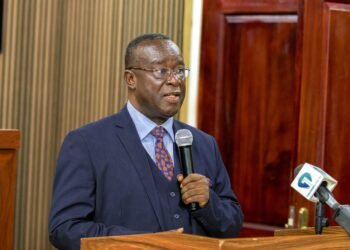Research conducted by the National Teaching Council (NTC) has revealed that majority of various public school heads have no prerequisite skills and training in school administration.
According to the research, 94.5 percent of headmasters and headmistresses in public schools have no formal training in school management.
A situation the minister of education, Dr Yaw Osei Adutwum, has described as unacceptable, hence the need to train head teachers to improve school administration.
“This cannot happen in this 21st century that you can become a head of a school without formal training.”
Dr Yaw Osei Adutwum
To address the situation, Dr Adutwum disclosed that the Ministry through the National Education Institute and the National Inspectorate is mobilising all agencies under the Ministry to train heads of schools to equip them with modern knowledge in school administration.
The minister in a meeting with Non-Governmental Organisations and Civil Society Organisations in the education sector, called for support for the Ministry to deliver on its strategic objectives. This, he noted, is crucial because the Ministry needed the experiences of these organisations to champion the government agenda on transformational education for socio-economic development.
The Role of Government in Improving Education
Explaining the roles government is playing to improve education, the Minister highlighted the introduction of the National Standardized Test for all primary four students in the country, which started in December 2021. This, he said, will help to evaluate learning outcomes in English and Mathematics at the primary school level.
The minister stressed that this years’ timetable for the test would come out early for primary two, four and six, adding that the initiative would create a system to ensure value for money.
Dr. Adutwum noted that President Nana Addo Dankwa Akufo-Addo recently broke grounds for the construction of a Science, Technology, Engineering and Mathematics (STEM) School in Accra, to reorient the educational system to focus more on science and technology.
As part of commitment to the advancement of STEM education in the country, he revealed that the government has commenced the development of 20 STEM centres, and 10 model STEM Senior High Schools across the country, which were at various stages of completion.
According to the minister, the construction of STEM Schools was necessitated by calls from stakeholders and industry experts on the need for the country’s curriculum to reflect the demands of the industry.
Dr Adutwum announced government’s intention to roll out the Community of Excellence Project to enhance literacy among children and to ensure continuity of access to education of the younger generation. Under the project, he indicated that the government envisioned a community where 90 per cent of the children at the age of 10 would be able to read and write meaningfully, and progress from Junior High School to Senior High School and transition to the tertiary level.
The NGOs commended the Minister for the engagement and stated that such collaboration would improve the country’s educational system.
Bright Appiah, the Executive Director of Child Right International, urged the Minister to be proactive with incentives for teachers in rural schools to address attrition challenges.
Peter Obeng-Asamoah, the Executive Director, Ghana Blind Union, appealed to the minister to include persons with disabilities in government educational programmes to ensure inclusive development.
READ ALSO: Bellwether Stocks Trade Flat For Second Consecutive Day But With Improved Market Activity



















